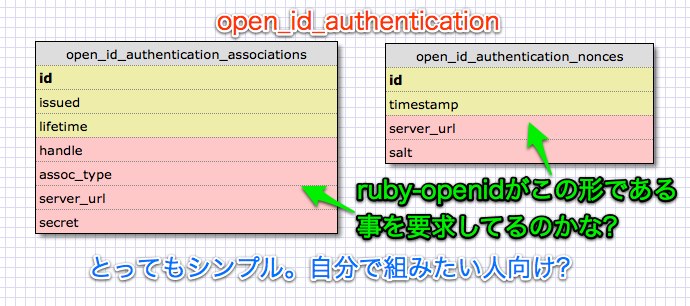プラグイン名
open_id_authenticationプラグイン
setup
何が出来るか
- OpenIDを使ってユーザ登録やログインする処理を作る
- OpenID Providerからの追加属性(メアドとか性別とか)取得サポート(SREG)
- OpenID Providerをホワイトリスト/ブリックリストで制限する
- OpenID URLからOpenID ProviderのURL(Endpoint URL)を調査して、上記ホワイト/ブラックリストに追加するためのスクリプトも用意(Maimuzoが適当に作った物)
- open_id_authenticationプラグインは、部品を提供しているに過ぎなく、ジェネレータなどは付いてこないので、基本的に処理は自分で作る必要がある
方針
- 結局、どんな機能が必要で、認証できた/出来なかったときどうしたいかは、アプリ毎に違うので定型化しない方がよい
- でも、フルスクラッチで作ると辛い
- open_id_authenticationを部品として使い、細かいところは自分で作る
- ジェネレータで作るより、コピペでがりがりやる。(ジェネレータ無いし)
- open_id_authenticationプラグイン自体にも手を入れる(そのままだとエラーの振り分けさえ出来ないので)
- 下記コードをそのまま動かすには、改造版が必要。これをvender/plugins/open_id_authentication/libに上書きして使う
標準作業
# sudo gem install ruby-openid
# script/plugin install open_id_authentication
# rake open_id_authentication:db:create
# rake db:migrate
お好みで
他の認証系プラグインを使わないならUserモデルを自作する必要がある
# script/generate model User nickname:string email:string claimed_url:string fullname:string birth_date:string gender:integer postcode:string country:string language:string timezone:string
以下のホワイト/ブラックリスト形式でOpenIDプロバイダに制限を加えるなら、そのリストを作る
# script/generate model TrastedOpenidProvider endpoint_url:string
ログインしないと見れないページがあるならapp/controllers/application.rbに追加する
class ApplicationController < ActionController::Base
# 未ログイン状態でログインが必要なページに入ろうとすると、元のページに戻される
# ログイン専用ページがない場合など
def block_until_authorized
unless login?
flash[:notice] = "Please log in"
redirect_to(request.referer)
end
end
# ログインが必要なページならば認証ページをはさみ、認証したらそのページに誘導する
# ログイン専用ページがある場合など
# 一部
# http://japan.internet.com/column/developer/20080627/26.html
# を参考に書き換え必要
def go_through_authorized
unless login?
flash[:notice] = "Please log in"
# save the URL the user requested so we can hop back to it
# after login
session[:jumpto] = request.parameters
redirect_to("/login")
end
end
end
add to app/helper/application_helper.rb
module ApplicationHelper
def login?
session[:user_id]
end
def logined_user
User.find(session[:user_id])
end
end
ログインが必要なページを指定する
class SomeController < ApplicationController
before_filter :block_until_authorized,
:only => [ :new , :edit, :create, :update, :destroy]
end
セッションコントローラーの作成
generate controller
# script/generate controller sessions
set route to config/routes.rb(RESTful風味)
map.open_id_complete 'session', :controller => "sessions", :action => "create", :requirements => { :method => :get }
map.resource :session
map.login '/login', :controller => 'sessions', :action => 'new'
map.logout '/logout', :controller => 'sessions', :action => 'destroy'
paste this controller
class SessionsController < ApplicationController
# TODO:change default page
@@default_page = "/"
# require property from a OpenID provider
# [:(User model property) => "(OpenID provider property in sreg)"]
@@required = {
:nickname => "nickname",
:email => "email"
}
# optional property from a OpenID provider (sreg)
# [:(User model property) => "(OpenID provider property in sreg)"]
@@optional = {
:fullname => "fullname",
:birth_day => "dob",
:gender => "gender",
:postcode => "postcode",
:country => "country",
:language => "language",
:timezone => "timezone"
}
# TODO:if your app has an especialy login page, you can use this index action
# GET /sessions/new
def new
#redirect_to :controller => "TODO::your_logined_user_controller" if login?
redirect_to default_page
end
# POST /sessions
def create
if using_open_id?
open_id_authentication
else
flash[:error] = "You must provide an OpenID URL"
redirect_to tyied_page
end
end
# DELETE /sessions
# GET /logout
def destroy
session[:user_id] = nil
redirect_to default_page
end
protected
def open_id_authentication
# request options
# :whitelist and :blacklist require ActiveRecord class
# need to modify oepn_id_authentication.rb
options = {
:required => @@required.values.map {|str| str.to_sym},
:optional => @@optional.values.map {|str| str.to_sym},
:whitelist => TrastedOpenidProvider,
:target_column => "endpoint_url"
}
authenticate_with_open_id(params[:openid_url], options) do |status, identity_url, registration|
case status.result
when :found_in_whitelist_or_blacklist
failed_login "Sorry, the OpenID server is blocked by the white list"
when :double_auth
failed_login "Error, detect a double autentication"
when :missing
failed_login "Sorry, the OpenID server couldn't be found"
when :canceled
failed_login "OpenID verification was canceled"
when :failed
failed_login "Sorry, the OpenID verification failed"
when :successful
if @current_user = User.find_by_claimed_url(identity_url)
successful_login
else
@current_user = User.new
assign_registration_attributes!(registration)
@current_user.claimed_url = identity_url
@current_user.nickname = identity_url.delete("http://")[0..8] if @current_user.nickname.blank?
if @current_user.save
successful_login
else
failed_login "Your OpenID profile registration failed: " +
@current_user.errors.full_messages.to_sentence
end
end
end
end
end
def successful_login
session[:user_id] = @current_user.id
#jumpto = session[:jumpto] || default_page
#session[:jumpto] = nil
#redirect_to(jumpto)
redirect_to(root_url)
end
def failed_login(message)
flash[:error] = message
redirect_to default_page
end
# if you don't use map.resource in config/routes.rb, you need to use root_url method:
# def root_url
# # TODO:check with config/routes.rb
# open_id_complete
# end
def default_page
@@default_page
end
def tyied_page
request.referer
end
# registration is a hash containing the valid sreg keys given above
# use this to map them to fields of your user model
def assign_registration_attributes!(registration)
model_to_registration_mapping.each do |model_attribute, registration_attribute|
unless registration[registration_attribute].blank?
@current_user.send("#{model_attribute}=", registration[registration_attribute])
end
end
end
# TODO:change this hash like your user model.
def model_to_registration_mapping
@@required.merge(@@optional)
end
end
必要ならapp/views/sessions/new.html.erbを作る
<% if flash[:error] -%>
<%= flash[:error] %>
<% end -%>
<% form_tag(session_url) do |f| -%>
<label for="openid_url" >
OpenId URL:
</label>
<%= text_field_tag :openid_url -%>
<%= submit_tag "Login" -%>
<% end -%>
公式ページ
日本語解説ページ
外国語解説ページ
のうはう
class AddOpenIdAuthenticationTables < ActiveRecord::Migration
def self.up
create_table :open_id_authentication_associations, :force => true do |t|
t.integer :issued, :lifetime
t.string :handle, :assoc_type
t.binary :server_url, :secret
end
create_table :open_id_authentication_nonces, :force => true do |t|
t.integer :timestamp, :null => false
t.string :server_url, :null => true
t.string :salt, :null => false
end
end
def self.down
drop_table :open_id_authentication_associations
drop_table :open_id_authentication_nonces
end
end
コメント
最終更新:2008年10月07日 15:35
